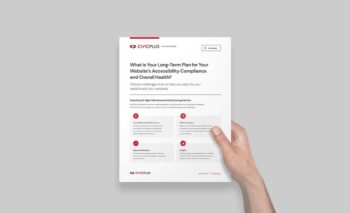What Colorado Local Governments Need to Know to Comply with Accessibility Law HB21-1110
Local governments must demonstrate a path to compliance by July 1, 2025.
[Update] On April 25, 2024, Colorado HB24-1454 was signed into law, granting a one-year extension to HB21-1110. The new date for compliance is July 1, 2025.
In a significant stride toward inclusivity, Colorado has enacted HB21-1110. The Act marks a pivotal moment in civil rights legislation as it aims to ensure that individuals with disabilities are not denied services or benefits due to inaccessible government websites. As local governments embrace contactless government and the power of technology to create positive civic experiences, every tool, application, and feature used to expedite service access for residents must accommodate the needs of every community resident regardless of their ability.
Colorado is the latest state to implement legislation to protect its residents from digital inequities. It comes shortly following the federal government’s commitment, under the Biden-Harris Administration, to improve the digital accessibility of federal websites and associated digital technology.
As stated by the Administration, “Currently, 61 million Americans live with a disability, but nearly half of the most popular Federal Government websites are not fully accessible to all Americans. This lack of accessibility could lead to millions of Americans having unequal access to critical services. That’s why … the Office of Management and Budget is releasing updated guidance that requires Federal agencies to put accessibility at the center of the Federal Government digital experience — so government can truly deliver for all Americans.”
For Colorado local government administrators, public communicators, and website administrators and their support teams that need to comply with Colorado Accessibility Law HB21-1110, what follows is a summary of the law, penalties for non-compliance, and some resources that may guide you towards avoiding legal repercussions — and, more importantly — ensure equitable access to your digital services for all residents. This information is not legal advice, and you should be working with your legal counsel to ensure compliance.
Key Provisions of Colorado Accessibility Act HB21-1110
HB21-1110 makes it clear that exclusion based on lack of accessibility for individuals with disabilities is a state civil rights violation. HB21-1110 bolsters existing Colorado laws safeguarding individuals with disabilities against discrimination, particularly concerning accessibility to government information technology. Key provisions of the Act include:
- Prohibiting the exclusion of persons with disabilities from public entity services or programs and emphasizing compliance with accessibility guidelines set by the Governor’s Office of Information Technology (OIT) by July 1, 2025 (updated).
- Mandating that Colorado agencies comply with accessibility standards established by the OIT, aligning with the Americans with Disabilities Act of 1990.
- Directing the Chief Information Officer within the OIT to maintain accessibility standards and promote their integration into the state’s information technology infrastructure.
- Requiring state agencies to fully implement accessibility plans as previously submitted to the OIT per a July 1, 2022 deadline, by July 1, 2025 (updated). Noncompliance will result in statutory remedies.
- Allocating funds to the Office of the Governor to support OIT in implementing the act.
Colorado Accessibility Act Noncompliance Financial Risks
Colorado government entities failing to meet web accessibility standards set forth by the OIT could face injunctions, monetary damages, or fines of up to $3,500 payable to affected individuals. Under this Colorado Accessibility Act legislation, liability for noncompliance differs depending on whether it pertains to content or platform hosting. The act ensures a collaborative effort between state agencies and the OIT to enhance accessibility standards and implementation methodology.
Responsibilities of Platform Providers and Content Owners to Comply with Colorado Accessibility Act HB21-1110
HB21-1110 places the onus on platform providers and content owners to ensure compliance. Platform providers like OIT and Colorado’s Statewide Internet Portal Authority (SIPA) are mandated to offer accessible platforms. At the same time, content owners, including state agencies and county governments, must ensure that their online content meets the specified standards.
Guidance and Resources for HB21-1110 Compliance
Local government entities can begin complying with HB21-1110 by contacting their website partner to ensure its platform is compliant. In addition, OIT offers a range of resources and support mechanisms. These include training sessions, accessibility guides, and newsletters. Local government officials must familiarize themselves with the Web Content Accessibility Guidelines (WCAG) and utilize evaluation tools to assess and enhance their online content.
Additionally, CivicPlus®, as a technology leader committed to local government digital accessibility, offers the following resources, tools, and guidance:
- Webinar: Accessibility is About People: Focusing on the human component of technology
- Webinar: Comprehensive Approach to Web Accessibility for Government Communicators
- Checklist: Evaluate Your Website for Digital Accessibility
- Commitment-Free Website Accessibility Scan
- Brochure: CivicPlus Web Accessibility Solutions
- Fact Sheet: Video Accessibility: Transcription, Translation, and Transcoding With CivicPlus Media
- Webinar: The Latest in Video Streaming and Accessibility with CivicPlus Media
- Webinar: Accessible Parks, Inclusive Communities: Enhancing Web Accessibility
- Blog: 7 Things Park and Recreation Professionals Should Know About Web Accessibility
Looking Ahead to a Compliant and Inclusive Future
As Colorado embraces a more inclusive digital landscape, local governments must prioritize accessibility compliance. By adhering to the guidelines set forth by HB21-1110 and leveraging available resources, local authorities can ensure equitable access to services and benefits for all individuals, regardless of ability.
Need Help With Accessibility Compliance Laws?
Our experts are ready to help ensure you are compliant and your local government website is accessible.



